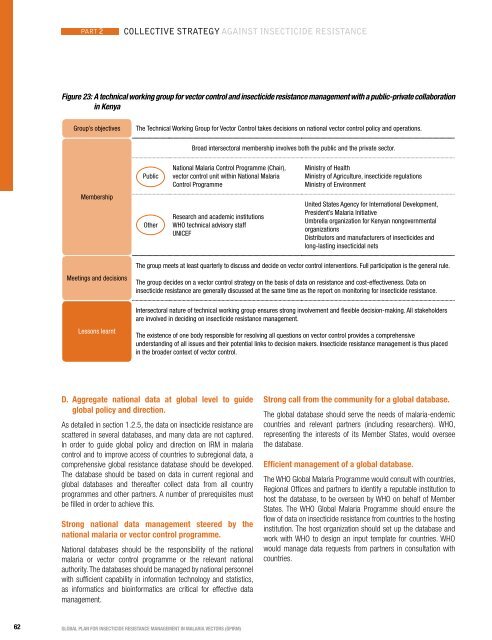Global plan for insecticide resistance management in malaria vectors
Global plan for insecticide resistance management in malaria vectors
Global plan for insecticide resistance management in malaria vectors
- No tags were found...
You also want an ePaper? Increase the reach of your titles
YUMPU automatically turns print PDFs into web optimized ePapers that Google loves.
Part 2Collective strategy aga<strong>in</strong>st <strong><strong>in</strong>secticide</strong> <strong>resistance</strong>Figure 23: A technical work<strong>in</strong>g group <strong>for</strong> vector control and <strong><strong>in</strong>secticide</strong> <strong>resistance</strong> <strong>management</strong> with a public-private collaboration<strong>in</strong> KenyaGroup’s objectivesThe Technical Work<strong>in</strong>g Group <strong>for</strong> Vector Control takes decisions on national vector control policy and operations.Broad <strong>in</strong>tersectoral membership <strong>in</strong>volves both the public and the private sector.PublicNational Malaria Control Programme (Chair),vector control unit with<strong>in</strong> National MalariaControl ProgrammeM<strong>in</strong>istry of HealthM<strong>in</strong>istry of Agriculture, <strong><strong>in</strong>secticide</strong> regulationsM<strong>in</strong>istry of EnvironmentMembershipOtherResearch and academic <strong>in</strong>stitutionsWHO technical advisory staffUNICEFUnited States Agency <strong>for</strong> International Development,President’s Malaria InitiativeUmbrella organization <strong>for</strong> Kenyan nongovernmentalorganizationsDistributors and manufacturers of <strong><strong>in</strong>secticide</strong>s andlong-last<strong>in</strong>g <strong>in</strong>secticidal netsMeet<strong>in</strong>gs and decisionsLessons learntThe group meets at least quarterly to discuss and decide on vector control <strong>in</strong>terventions. Full participation is the general rule.The group decides on a vector control strategy on the basis of data on <strong>resistance</strong> and cost-effectiveness. Data on<strong><strong>in</strong>secticide</strong> <strong>resistance</strong> are generally discussed at the same time as the report on monitor<strong>in</strong>g <strong>for</strong> <strong><strong>in</strong>secticide</strong> <strong>resistance</strong>.Intersectoral nature of technical work<strong>in</strong>g group ensures strong <strong>in</strong>volvement and flexible decision-mak<strong>in</strong>g. All stakeholdersare <strong>in</strong>volved <strong>in</strong> decid<strong>in</strong>g on <strong><strong>in</strong>secticide</strong> <strong>resistance</strong> <strong>management</strong>.The existence of one body responsible <strong>for</strong> resolv<strong>in</strong>g all questions on vector control provides a comprehensiveunderstand<strong>in</strong>g of all issues and their potential l<strong>in</strong>ks to decision makers. Insecticide <strong>resistance</strong> <strong>management</strong> is thus placed<strong>in</strong> the broader context of vector control.D. Aggregate national data at global level to guideglobal policy and direction.As detailed <strong>in</strong> section 1.2.5, the data on <strong><strong>in</strong>secticide</strong> <strong>resistance</strong> arescattered <strong>in</strong> several databases, and many data are not captured.In order to guide global policy and direction on IRM <strong>in</strong> <strong>malaria</strong>control and to improve access of countries to subregional data, acomprehensive global <strong>resistance</strong> database should be developed.The database should be based on data <strong>in</strong> current regional andglobal databases and thereafter collect data from all countryprogrammes and other partners. A number of prerequisites mustbe filled <strong>in</strong> order to achieve this.Strong national data <strong>management</strong> steered by thenational <strong>malaria</strong> or vector control programme.National databases should be the responsibility of the national<strong>malaria</strong> or vector control programme or the relevant nationalauthority. The databases should be managed by national personnelwith sufficient capability <strong>in</strong> <strong>in</strong><strong>for</strong>mation technology and statistics,as <strong>in</strong><strong>for</strong>matics and bio<strong>in</strong><strong>for</strong>matics are critical <strong>for</strong> effective data<strong>management</strong>.Strong call from the community <strong>for</strong> a global database.The global database should serve the needs of <strong>malaria</strong>-endemiccountries and relevant partners (<strong>in</strong>clud<strong>in</strong>g researchers). WHO,represent<strong>in</strong>g the <strong>in</strong>terests of its Member States, would overseethe database.Efficient <strong>management</strong> of a global database.The WHO <strong>Global</strong> Malaria Programme would consult with countries,Regional Offices and partners to identify a reputable <strong>in</strong>stitution tohost the database, to be overseen by WHO on behalf of MemberStates. The WHO <strong>Global</strong> Malaria Programme should ensure theflow of data on <strong><strong>in</strong>secticide</strong> <strong>resistance</strong> from countries to the host<strong>in</strong>g<strong>in</strong>stitution. The host organization should set up the database andwork with WHO to design an <strong>in</strong>put template <strong>for</strong> countries. WHOwould manage data requests from partners <strong>in</strong> consultation withcountries.62GLOBAL PLAN FOR INSECTICIDE RESISTANCE MANAGEMENT IN MALARIA VECTORS (GPIRM)
















